The world of broadband can be confusing, unlike other utilities such as electricity, water or gas, the internet service you receive in your home can be different from your neighbour. The sector doesn’t help itself, the industry is full of made up words and acronyms such as ‘ADSL’, ‘FTTC’ or ‘USO’.
But are broadband providers hiding behind these confusing terms, or even benefitting from not using more straightforward language?
In a recent survey, we asked 2,008 UK broadband customers what they think of the current terminology providers use when selling their products.
We discovered 63% of bill payers feel broadband terminology is confusing, and 54% think providers hide behind these confusing terms to squeeze more money out of us.
Chart 1: Could the technical terms used in broadband deals could be much clearer
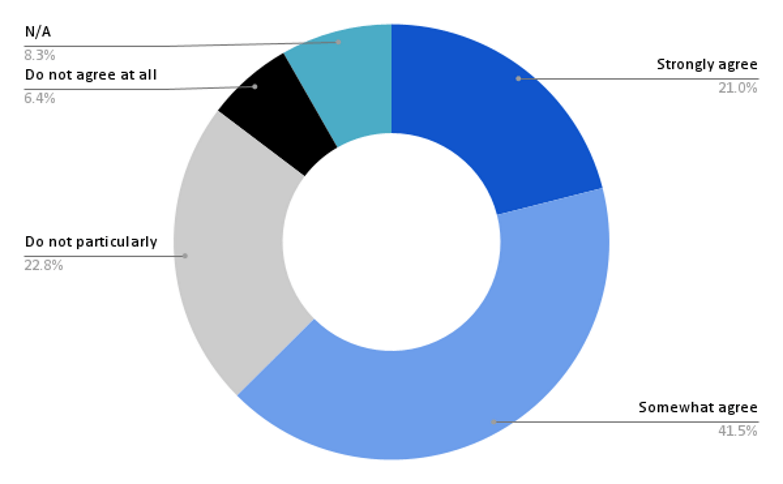
(Chart 2: Do broadband providers hide behind confusing terms to get the most money out of their customers

A closer look into specific acronyms, reveals some of the most used terms are also some of the most confusing. As few as 5% of respondents understand what ‘FTTP’ is and only 10% understand ‘Mb’, the unit of measurement the telecom's industry uses to measure broadband speed.
Overall, no term could be defined by a majority. The word customers would feel confident explaining is ‘Wi-Fi’, but this was still significantly below half of respondents, at 40% able to explain it.
Table: Which of the following broadband-related terms would you feel confident explaining to someone/be able to define?
| Broadband related term | % that could define or explain it to someone |
|---|---|
| One Touch Switch | 2% |
| FTTH | 3% |
| ADSL | 4% |
| FTTC | 4% |
| FTTP | 5% |
| Gigabit broadband | 6% |
| Fair use policy | 8% |
| Openreach network | 8% |
| Bandwidth | 9% |
| Mb or Mbps | 10% |
| Ultrafast broadband | 14% |
| Superfast broadband | 16% |
| Set-up cost | 17% |
| Upload speed | 18% |
| IP address | 19% |
| Fibre optic broadband | 20% |
| Download speed | 22% |
| Streaming | 25% |
| Router | 29% |
| Broadband | 30% |
| Wi-Fi | 40% |
| None of the above | 24% |
A huge implication of this is that new customers shopping for broadband may feel they lack confidence making a good decision. We found that 44% of shoppers worry that when signing up to a new deal, it’s not the right one for their needs and 31% of customers have been put off switching to a new deal because of the confusing language.
Chart 3: Do customers worry when signing up for a new broadband deal that it’s not the right one for them?
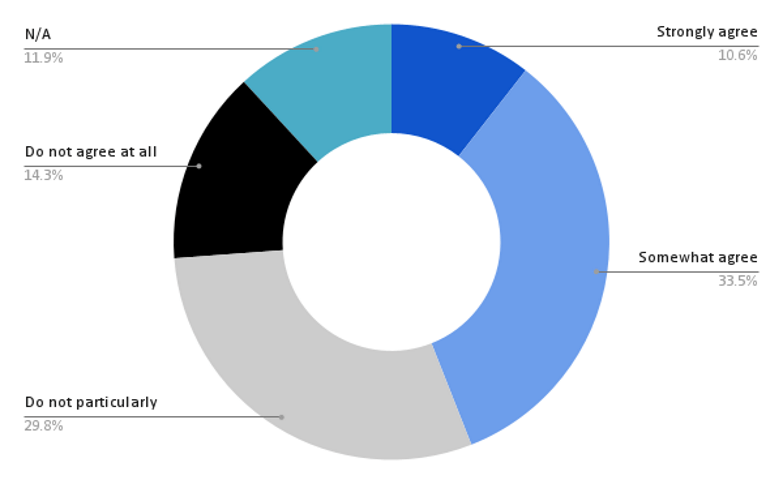
Chart 4: Shoppers that have been put off switching or signing up to a new broadband deal because of the terminology broadband providers use
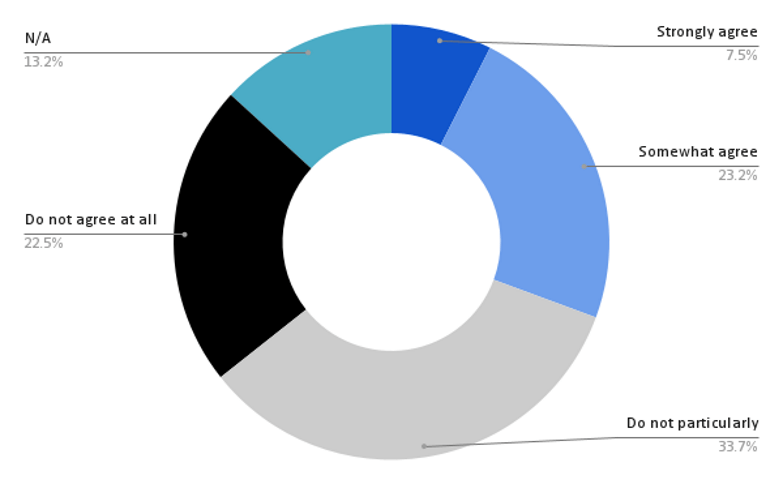
Those who are put off switching, pay on average £227 a year more than a new customer. Broadband contracts usually run for 12, 18 or 24 months. After this term expires, providers shift these customers onto a rolling monthly contract, usually on a higher monthly rate.
Not only does this increase the strain on finances, users can be stuck on contracts that aren’t fit for purpose. Our research shows that 22% of customers are tied into contracts that do not meet their household's broadband needs.
Chart 5: My home broadband is slower than I need
.png)
Results between male and female bill payers are very similar. However, there are some big differences between age groups. Our research found that 73% of people aged 65 and over are confused by broadband terminology, the most of any age group.
Chart 6: The technical terms used in broadband deals could be much clearer by age category
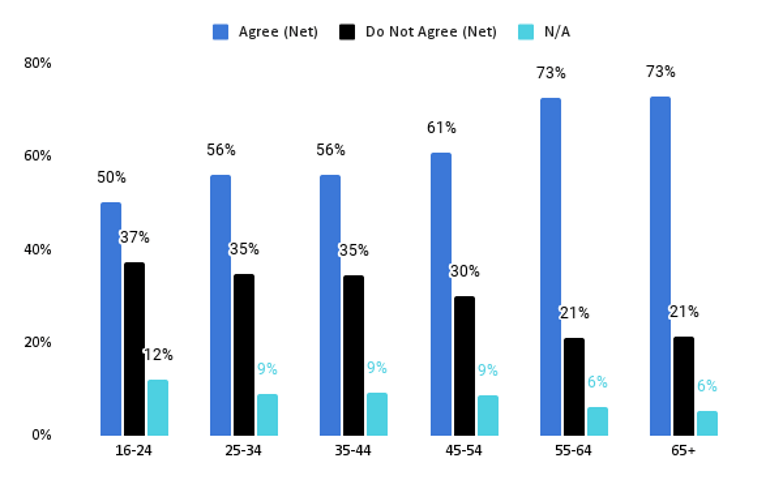
When looking at customers by provider, Plusnet customers express the most desire for clearer broadband terminology at 74%. Vodafone’s and EE customers are the most confident. For the majority of customers across all providers, the consensus is that terminology in broadband needs to be made clearer.
Chart 7: The technical terms used in broadband deals could be much clearer by provider
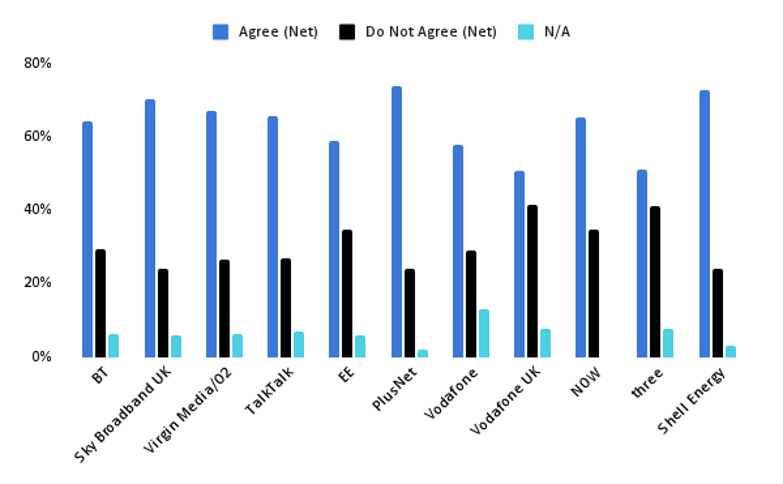
Ofcom, the industry regulator is currently reviewing how companies use different terms in their contracts. Under new guidance planned, customers would be given a short, easy-to-understand description of the type of broadband network technology they are signing up to.
It would also mean that providers could only use terms such as ‘fibre’ when describing deals where fibre-optic cables are connected all the way up to properties. This is currently known as ‘FTTP/H’ (fibre to the premises). However, early signs suggest this guidance won’t be welcomed by some of the UK’s biggest providers.
Alex Tofts, broadband expert at Broadband Genie, comments:
“The language used by broadband providers has been bewildering customers for years, so any move towards greater transparency in how deals are described is a step in the right direction.
“Confusion still reigns between fibre and full fibre, while terms like superfast and ultrafast often leave consumers scratching their heads and struggling to know the difference.
“By embracing Ofcom's proposals, providers can give customers confidence in their broadband choices, potentially spurring more to make the switch to the right deals for them. However, it has not yet been made clear yet when Ofcom will introduce the proposed changes or how it will enforce them.
“However, the responsibility does not lie solely at Ofcom’s door. The ASA must also take action to ensure that providers are not drawing in customers with information that blinds them with science.
"Our report shows that a third of people have been put off switching broadband deals because they are confused about the language used by providers.
“Out-of-contract customers could save an average of £227 a year by moving to a cheaper deal, so any changes brought in by Ofcom can’t come soon enough."
If you come across a term or acronym you don’t understand, we’ve put together a glossary that should have you covered.
Why do we need your address?
We need your address to show you the broadband deals available at your home. This information is gathered in partnership with thinkbroadband.
Read our privacy policy for more details.